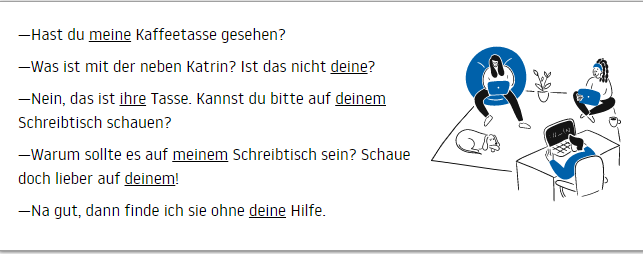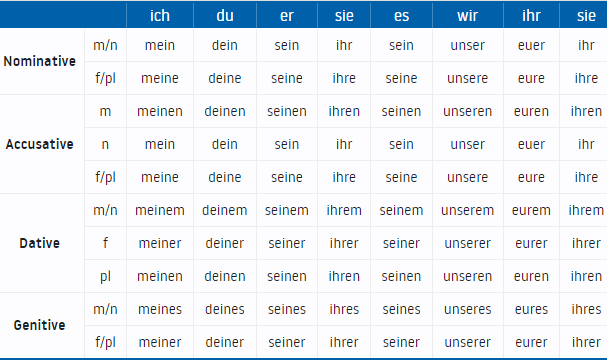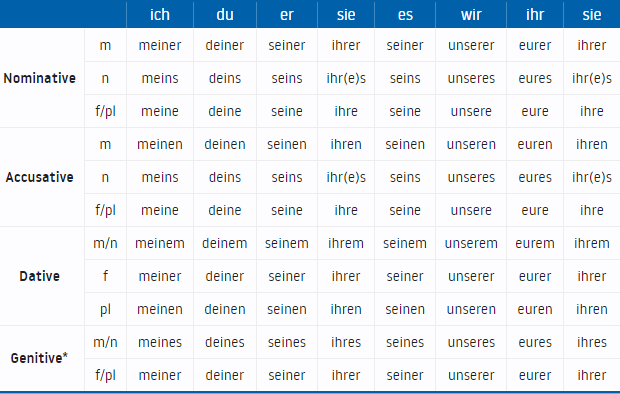Possessive Pronouns in German Grammar
Possessive Articles and Possessive Pronouns in German Grammar

Possessive pronouns in German indicate possession. We differentiate between dependent possessive pronouns and independent possessive pronouns.
Possessives (Possessivpronomen) indicate ownership and possession; they allow us to express what belongs to whom.
What is a possessive?
There are two types of possessives in German grammar: possessive articles, which accompany a noun, and possessive pronouns, which stand in place of a noun.
Example: Das ist unser Haus. . (possessive article). *unser Haus = our house
Das kleine Haus ist unseres. . (possessive pronoun). *unseres = ours.While the German possessives work similarly to English possessives like my/mine, your/yours, their/theirs, etc., German possessives must be declined according to the case (nominative, accusative, dative or genitive) and they must agree with the noun they are modifying in terms of gender and number.
Read on to learn all about possessives in German grammar, then put your knowledge to the test in the exercises.
Example

Table of German Possessive Articles
Possessive articles, also known as dependent possessive pronouns or possessive adjectives, come before nouns. They are similar to the English forms my, your, his, our, etc.
German possessive articles are declined and agree with the noun they modify in terms of gender and number.
Example: Hast du meine Kaffeetasse gesehen? .
*feminine singular noun; accusative = meine.
Ich habe schon auf meinem Schreibtisch geschaut. .*masculine singular noun; dative = meinem.
The table below shows all forms of the German possessive articles.

Table of German Possessive Pronouns
Possessive pronouns, also known as independent possessive pronouns, stand in place of a noun. They are similar to the English forms mine, yours, theirs, ours, etc.
German possessive pronouns are declined and agree with the noun they are replacing in terms of gender and number.
Example: Wem gehört die Tasse? . — Das ist meine.
*feminine singular noun; nominative = meiner.
Das ist nicht deine Tasse sondern ihre. .*feminine singular noun; accusative = ihre.
The table below shows all forms of the German possessive pronouns.

*We only use possessive pronouns in the genitive after certain expressions (see Declension/Genitive).
Example: Es bedarf deiner Hilfe, nicht meiner. .
Possessive Pronouns in German Grammar
|
|
|
||
|
I – my
|
|||
|
I can’t find my key.
|
|||
|
I can’t find my ticket.
|
|||
|
|
|
|
|
|
you – your
|
|||
|
Have you found your key?
|
|||
|
Have you found your ticket?
|
|||
|
|
|
|
|
|
he – his
|
|||
|
Do you know where his key is?
|
|||
|
Do you know where his ticket is?
|
|||
|
|
|
|
|
|
she – her
|
|||
|
Her money is gone.
|
|||
|
And her credit card is also gone.
|
|||
|
|
|
|
|
|
we – our
|
|||
|
Our grandfather is ill.
|
|||
|
Our grandmother is healthy.
|
|||
|
|
|
|
|
|
you – your
|
|||
|
Children, where is your father?
|
|||
|
Children, where is your mother?
|
|||
|
|
|
|
|
finally, now you know Possessive Pronouns in German Grammar. Also for more lesson you can download learning German App. Download the app





























